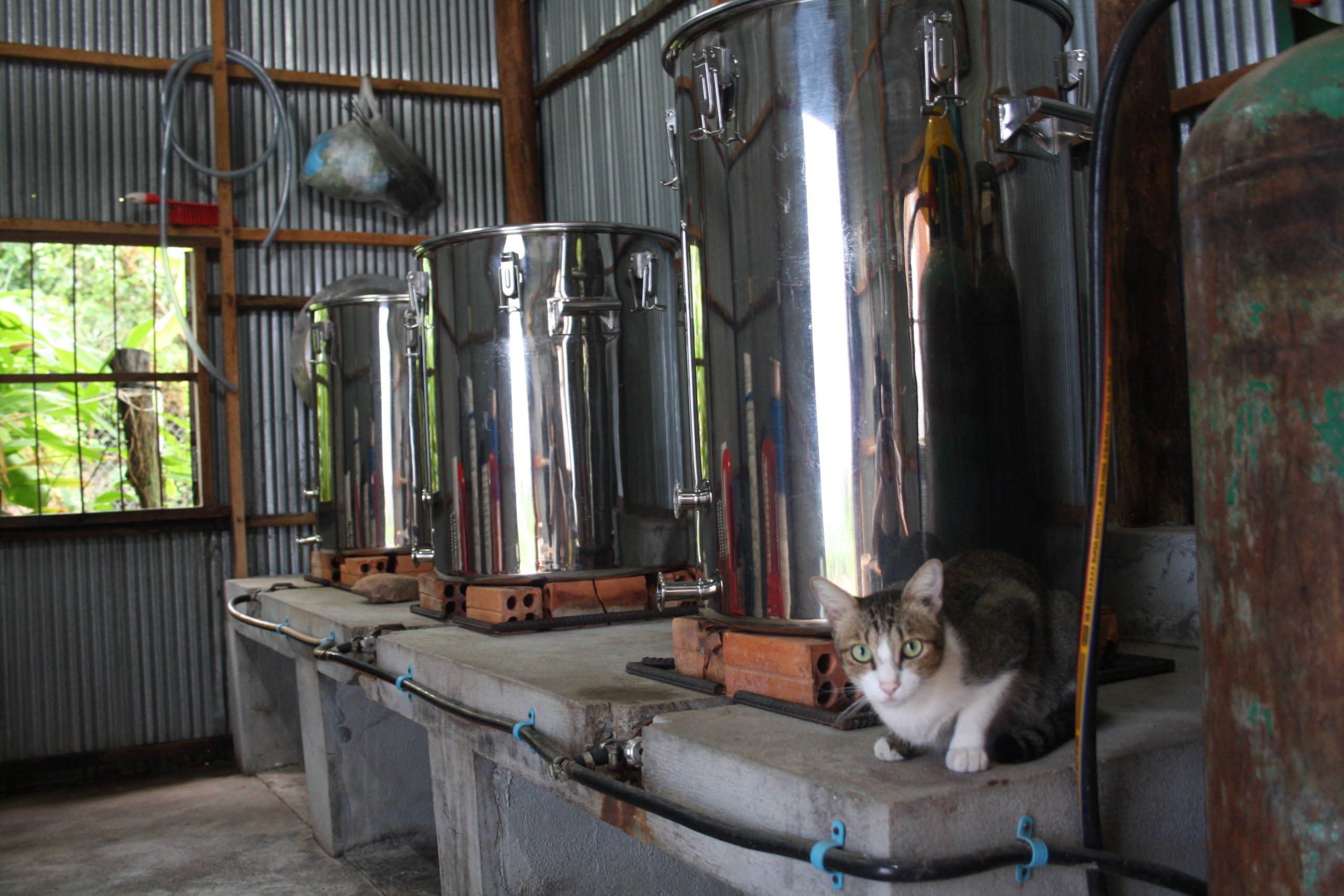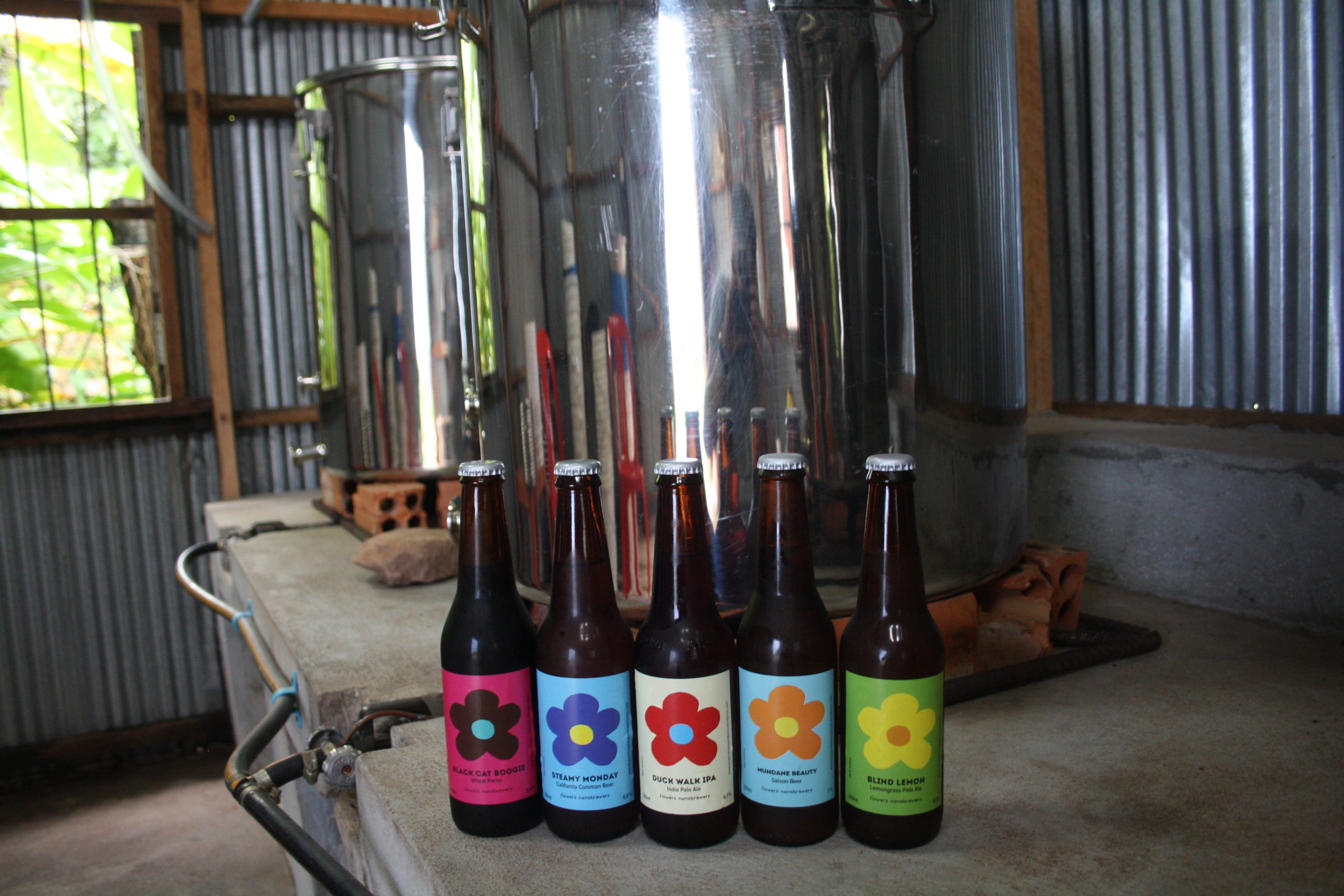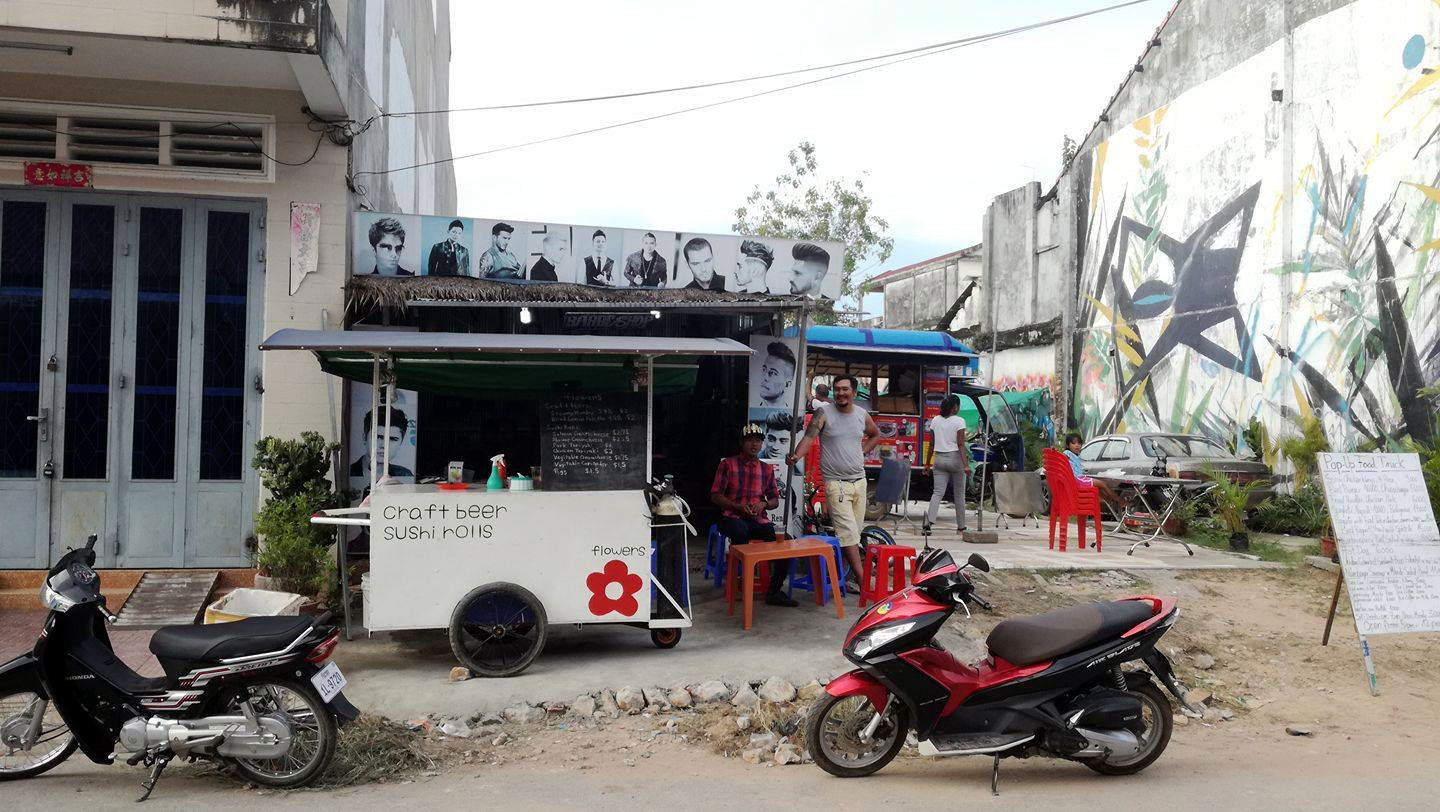Typically, a brewery will choose to scale-up, not scale-down. Taste is important, but sales are essential. Graduates are hired fresh from college, tasked to think of new, innovative ways to get beer from factory, to tap, to glass, to mouth, as quickly as possible – for as little cost and as many times as possible.
Size matters, too.
In Sihanoukville, Cambrew’s Angkor Brewery can produce up to 12 million hectolitres a year, the distinctive Angkor Wat silhouette adorning many a tap in the Kingdom. Snow Beer, the largest selling beer in the world, sells over 100 million hectolitres every year. Its owner SABMiller boasts that it can fill 12 Olympic sized swimming pools with the amount it sells, every day, for a year.
You would be hard pressed to find an Olympic pool in Kampot, but you will find Flowers Nanobrewery – Cambodia’s first craft nanobrewery.
Nano in every sense of the word, the tiny craft brewery is run out of a collection of outhouses by Japanese-born Yuki Aotani. The brewing hut is a small self-made corrugated iron shed, the fermentation chamber a spare room; furnished with a bed, an extremely strong air-con and barrels of fermenting beer.
Unlike the huge volumes produced by Cambrew and SABMiller, Flowers can brew only 600 litres a month – the equivalent of just over 7,000 a year. “Breweries survive by scaling up and producing more, but I just don’t want to do that,” said Yuki. “We’re small – we’re not even microbrewery size!”
Yuki has been the one-man-brewmaster running Flowers for half a decade out of his home-cum-brewery in Kampot, on Cambodia’s south coast. But his craft beer journey started in New Orleans, via Tokyo, before settling in the city renowned for its pepper, not its assortment of IPA.
While working in New Orleans, a microbrewery on his street gave Yuki his first taste of craft beer. “That was very much my first encounter with it, but I didn’t think it was anything special at the time,” admitted Yuki. “I didn’t really realise that there was a difference at first, between craft and your normal stuff.”
It would be a ‘moonshine’ party back in his native Tokyo that motivated Yuki to start brewing. “A friend was throwing a party and he had brewed all the beer himself,” remembered Yuki. “It was very good – I didn’t know that good beer could be brewed at home!”
Yuki immediately bought a home brewing kit, scoured the necessary books and began to brew the first batch in his Tokyo apartment that would lay the foundations of Flowers Nanobrewery.
“The first batch wasn’t great, it was actually very bad,” said Yuki. “I wasn’t sure of what I was doing at first.” Using his flat and his start-up home brewing kit Yuki started slowly, brewing a little over 10 batches during the first two years. “It is actually illegal to homebrew in Tokyo,” admitted Yuki.
And then, the craft scene in Tokyo boomed, and the brewer looked to take his flowering brewery somewhere else, away from the crowd. “All of a sudden, microbreweries started popping up everywhere,” Yuki said. “There were as many microbreweries as barbershops!”
Not wanting to compete in a saturated Japanese market, Yuki looked where he could relocate. He looked across Thailand, within Bali, as well as nearby Sihanoukville, before setting up shop in Kampot. “I wanted to be away from a big city, as well as by the ocean – so it seemed the perfect fit,” Yuki explained.
While the country’s tipple of choice are the mainstream Angkor, Anchor and Cambodian Lager brands, the Kingdom is no stranger to a craftier affair, with a burgeoning small-scale beer scene in the country’s cities growing over the years.
From 2014 to 2018, the number of microbreweries in the Kingdom jumped from two to nine, with the number still growing. First on the scene was the Himawari Microbrewery in 2012, brewing out of the Himawari Hotel in Phnom Penh. Cerevisia Craft Brewery, run by American Erich Phillips, followed soon after in 2013 and operates a couple of venues across Phnom Penh.
In 2015, at the age of 40, Yuki joined the Cambodian craft scene and made the move to Kampot, building Flowers, from the ground up.


He built the brewing hut, set up the fermentation chamber and tried to source the equipment he needed. “I must have called up almost 100 places in China,” said Yuki. “In the end, only two places had the parts I needed.”
The all-important ingredients, however, was another essential commodity that had to be imported in.
“I could only get the barley from Vietnam,” explained Yuki. “The first time I went to pick it up, I didn’t have a big order, so I drove on my motorbike, picked up almost 50kg of barley, strapped it onboard and headed back to Kampot!”
Nowadays, with a larger 400kg delivery of barley, he picks up the order from Phnom Penh and takes a taxi straight to the nanobrewery, “much smarter and much, much easier” said Yuki.
But even the equipment, the knowhow and the barley doesn’t guarantee immediate success – brewing is a craft.
Yuki started out in his new brewery with a German Wheat, and he says it’s the style that still causes him the most difficulty perfecting. “Finally, I managed to brew the first batch, and it was bad,” said Yuki. “I kept brewing batch-after-batch, the first 20 I would have to dump, before finally achieving a good beer.” Since, Yuki has expanded his selection, ranging from farmhouse style ales to stouts and more.
It’s very important to me that Flowers remain small and unique – that’s why I’m doing this … Otherwise, we’d just be another Heineken or Budweiser
The beers, however, needed a market. When it became clear that the makeshift bar he set up at his home would not attract customers, Yuki took to the streets.
“I decided to build a mobile bar, one that I could attach to the back of my motorcycle,” he explained. Along with his freshly prepared sushi, Yuki would traverse the lanes of Kampot, selling sushi and pouring cold beer at $2 a glass. He even provided a plastic stool, for weary customers.
“It had a good start, maybe too good a start,” said Yuki. Many restaurant owners were not too keen on Yuki’s mobile bar taking away their customers. “Some of them even called the police,” he remembers. “Another few complained, so I had to move the stall around town.” The constant moving and insecurity forced Yuki to turn off the ignition and head back to the brewery.
Forced into a rethink, Yuki reopened the bar and, in 2018, started bottling the beers, ready for export around Cambodia.

Flowers was one of the first craft places in the country to start bottling their beers and Yuki says that demand rocketed. “Our first batch that we bottled, the next day it had gone,” he said. Such was the demand, he had to stop taking orders so as to deliver on time.
The restaurant also started to gain more notoriety, but Yuki believes that some of Kampot’s backpackers came for the sushi, not the beer. “They’re not really our target market, but we would get backpackers wandering in from the local hostels, but I think they were there more for the sushi and not our beer.”
The beers themselves lend their names from Yuki’s time spent in the US and his resulting passion for blues music. Steamy Monday, a Californian-style pale ale, takes its name from the song Call It Stormy Monday by T-Bone Walker, while the Duck Walk IPA name is derived from Chuck Berry’s iconic ‘duckwalk’ dance move.
While Flowers’ popularity has endured among Cambodia’s craft scene, when Covid-19 hit, while not irrecoverably damaging the business, it dented it. “I don’t know what to do,” said Yuki. “The pandemic has affected our production and the demand from restaurants and bars for our beer, who just don’t have the demand themselves, anymore.”
But Flowers is still brewing, bottling up variations of craft beer, for the thirsty lips of Cambodia. And for Yuki, the essence of craft is all in the name – beer handmade with craft and skill, in small quantities. “Craft brewing is small and unique, that’s why I like it,” he said.
Yuki prides himself on the uniqueness of his beer and, while bucking a typical business plan, being that bit more difficult to find. “It’s more fun being different, having a beer that’s harder to get your hands on,” he said. “You can’t just pop to the store and pick up a bottle.”
And whatever happens, Yuki is unwavering in that admirable aim. “It’s very important to me that Flowers remain small and unique – that’s why I’m doing this,” said Yuki. “Otherwise, we’d just be another Heineken or Budweiser.”


